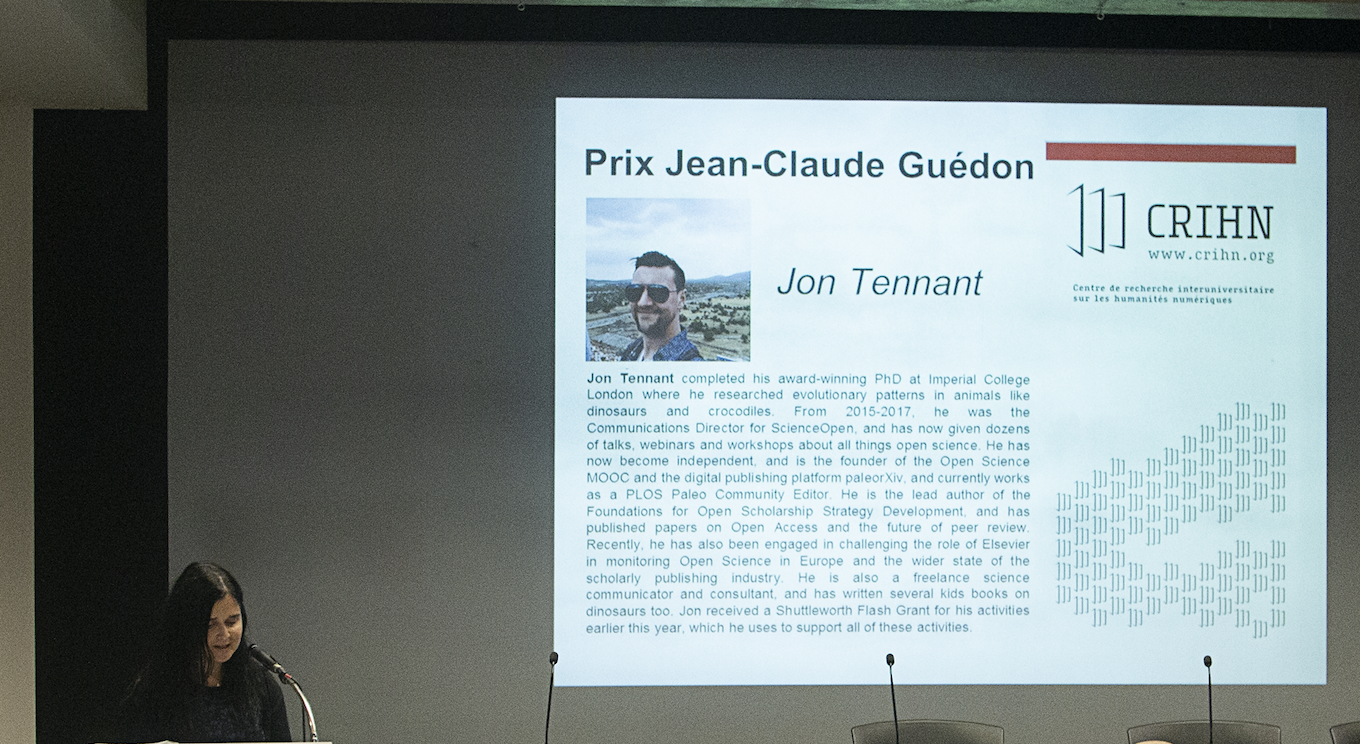Gagnant du Prix Jean-Claude Guédon 2018


Au nom du comité du Prix Jean-Claude Guédon, Sophie Marcotte a annoncé que le gagnant du concours 2018 est Jon Tennant. Voici le texte de sa présentation lors du colloque du CRIHN (la traduction anglaise se trouve plus bas) :
Il me fait plaisir de vous annoncer cet après-midi le nom du récipiendaire de la première édition du Prix Jean-Claude Guédon, qui a été créé pour récompenser le meilleur article paru au cours de la dernière année portant sur le libre-accès rédigé par un chercheur ayant soutenu sa thèse de doctorat depuis moins de dix ans. Le jury, formé d’Aurélien Berra, Emmanuel Château-Dutier et moi-même, est heureux d’accorder le prix à Monsieur Jonathan Tennant, pour son article intitulé « A multi-disciplinary perspective on emergent and future innovations in peer review ». Cet article, rédigé en collaboration notamment avec Jonathan Dugan et Daniel Graziotin, a impressionné le jury par l’ampleur de la réflexion et de la synthèse proposées. L’article fait état des différentes étapes historiques de l’évaluation par les pairs et des diverses expérimentations contemporaines en la matière. Il réunit une bibliographie très étoffée et extrêmement pertinente sur le sujet. Qui plus est, le choix de la plateforme de publication est parfaitement cohérent avec l’objet et le propos de l’article, puisque celui-ci a été évalué en Open Peer review et que les auteurs ont profité des remarques qui ont été formulées pour améliorer leur travail. Enfin, M. Tennant a su réunir un réseau d’experts et mettre en œuvre un processus de rédaction ouvert. Félicitations, donc, à Jonathan Tennant et à ses collaborateurs.
Vous pouvez aussi lire la biographie de Jon Tennant :
Jon Tennant completed his award-winning PhD at Imperial College London where he researched evolutionary patterns in animals like dinosaurs and crocodiles. From 2015-2017, he was the Communications Director for ScienceOpen, and has now given dozens of talks, webinars and workshops about all things open science. He has now become independent, and is the founder of the Open Science MOOC and the digital publishing platform paleorXiv, and currently works as a PLOS Paleo Community Editor. He is the lead author of the Foundations for Open Scholarship Strategy Development, and has published papers on Open Access and the future of peer review. Recently, he has also been engaged in challenging the role of Elsevier in monitoring Open Science in Europe and the wider state of the scholarly publishing industry. He is also a freelance science communicator and consultant, and has written several kids books on dinosaurs too. Jon received a Shuttleworth Flash Grant for his activities earlier this year, which he uses to support all of these activities.
It is my pleasure to announce this afternoon the name of the recipient of the first edition of the Jean-Claude Guédon Prize, which was created to reward the best article published in the last year on open access by a researcher who has defended his doctoral dissertation during the last ten years. The jury, composed of Aurélien Berra, Emmanuel Château-Dutier and myself, is pleased to award the prize to Jonathan Tennant, for his article entitled « A multi-disciplinary perspective on emerging and future innovations in peer review« . This article, written in collaboration with Jonathan Dugan and Daniel Graziotin, impressed the jury with the breadth of thought and synthesis. The article discusses the different historical stages of peer evaluation, and the various contemporary experiments in the field. It brings together a very extensive and extremely relevant bibliography on the subject. Moreover, the choice of the publication platform is perfectly coherent with the object and purpose of the article, since it has been evaluated in Open Peer review, and the authors took advantage of the comments that were made to improve their work. Finally, Mr. Tennant has assembled a network of experts and implemented an open drafting process. Congratulations, therefore, to Jonathan Tennant and his associates.
Ce contenu a été mis à jour le 31 octobre 2018 à 22 h 35 min.